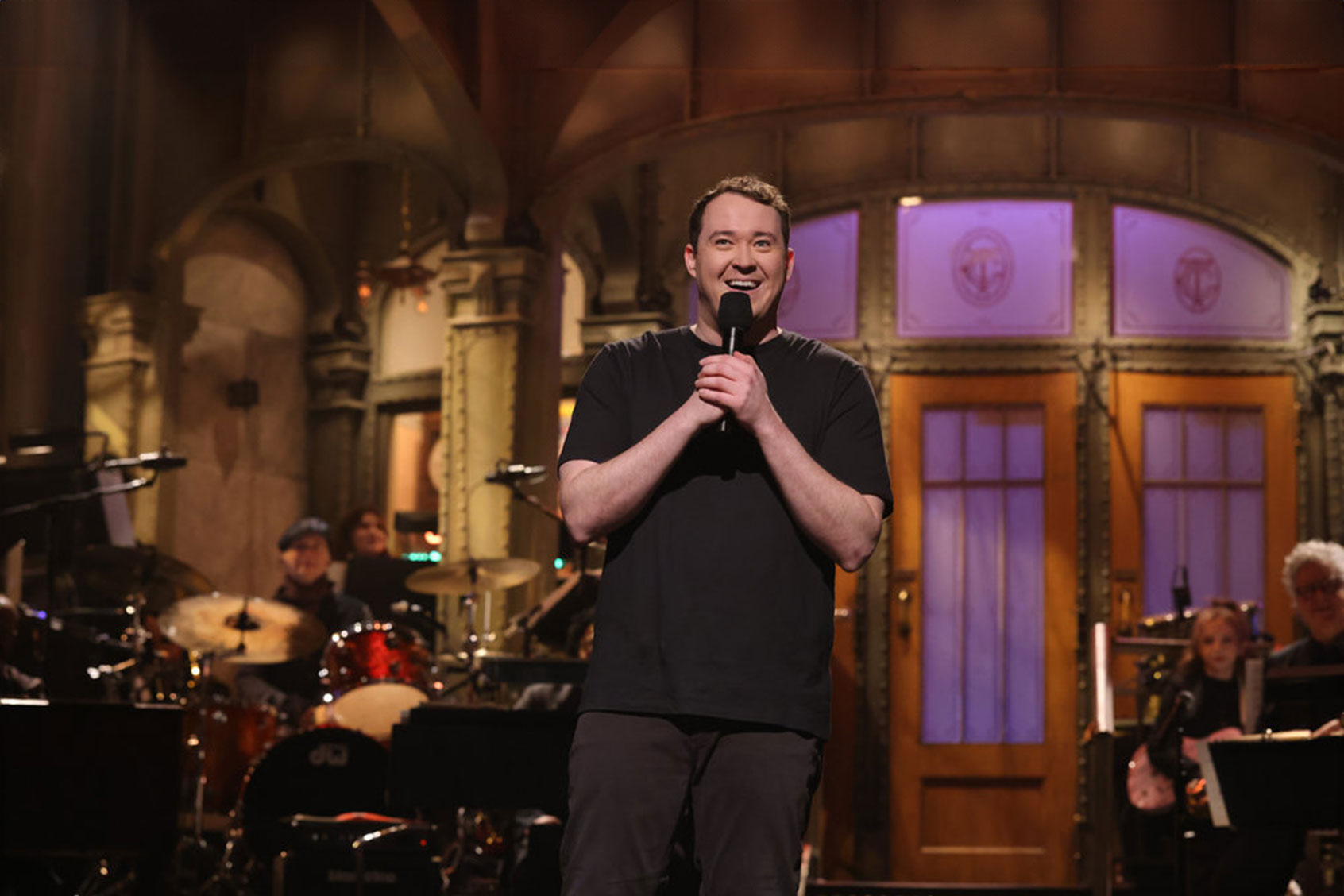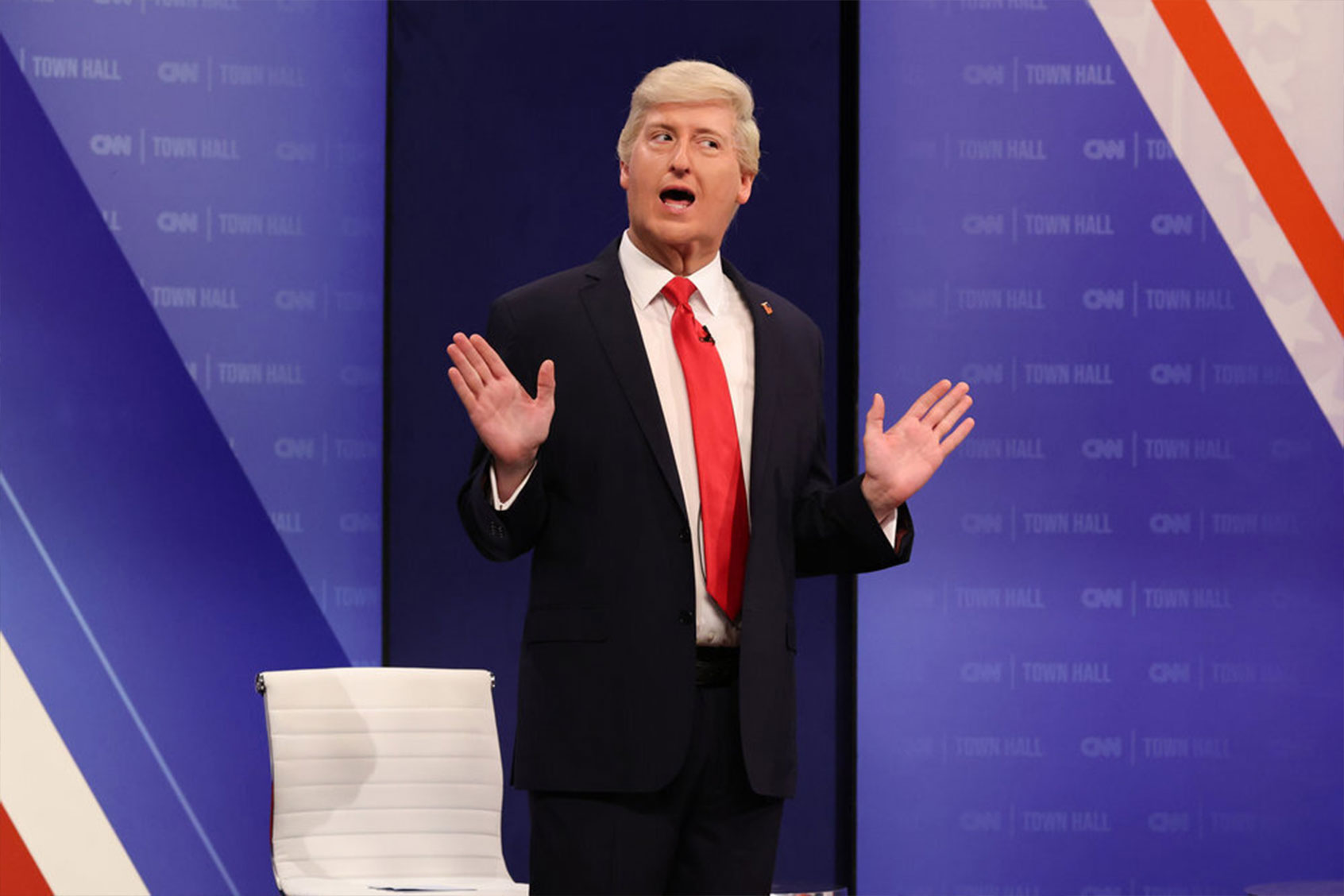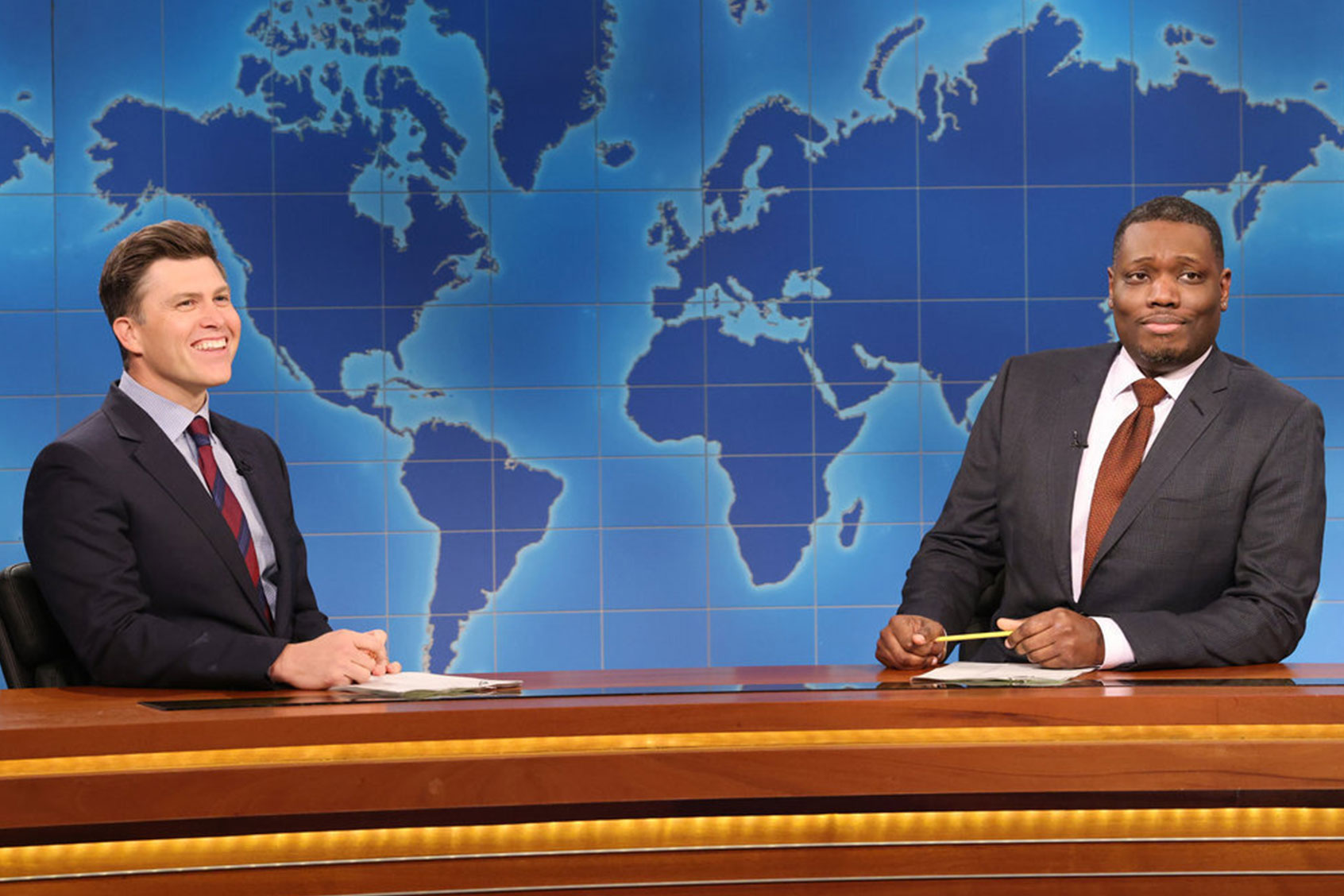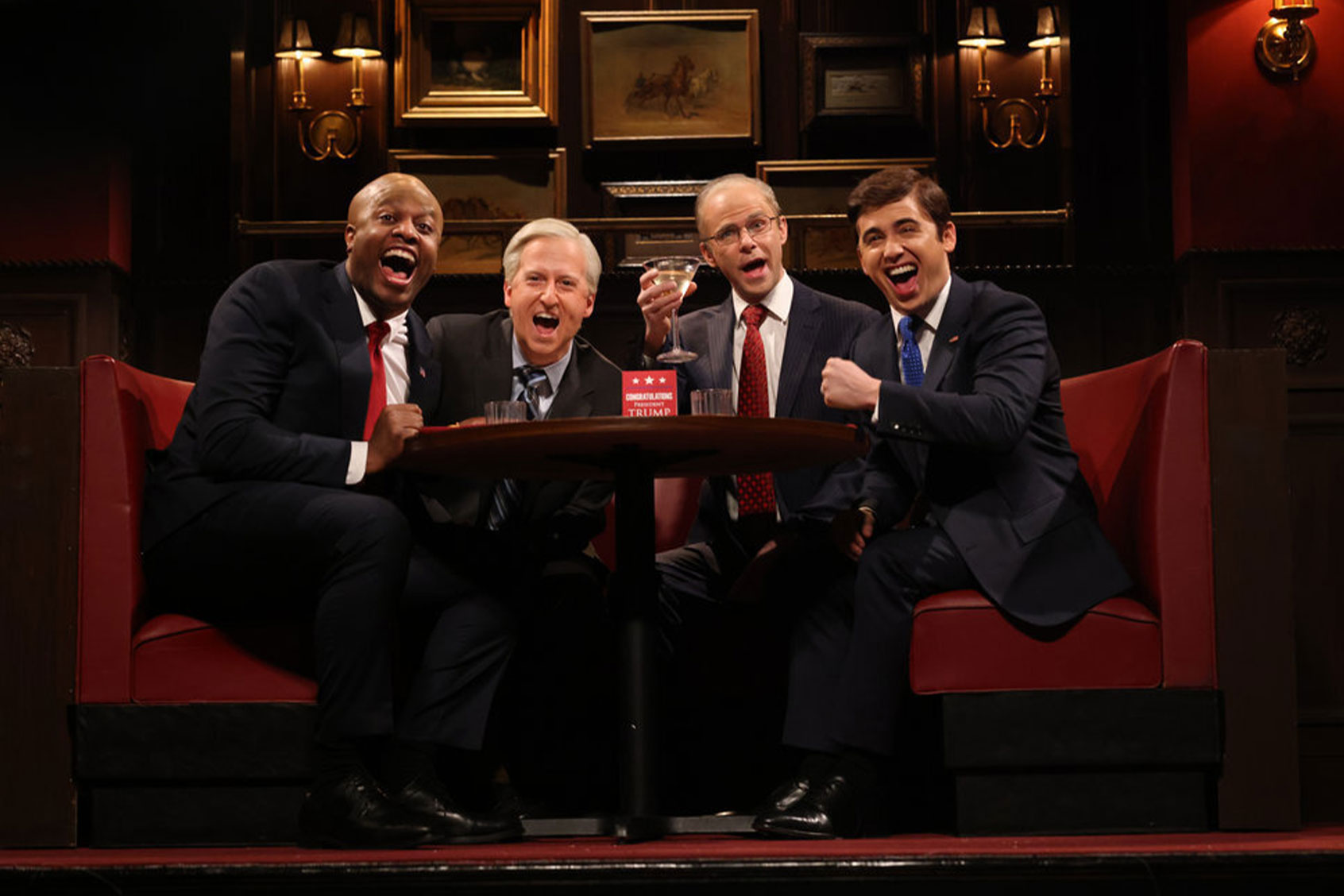Over the nearly 50 years that “Saturday Night Live” has been on the air the headlines it generates take on a certain sameness. We search for signs of its essentiality, wondering whether it remains relevant in seasons devoid of superstars among its repertory players.
We bemoan its lack of superstar hosts and, worse, express outrage when the show platforms someone like billionaire doofus edgelord Elon Musk, or more recently, self-described racist comedian Shane Gillis, who was hired as a featured player in 2019 before video surfaced of the comic gleefully using a slur for Chinese people and other racist jokes made in his comedy podcast. Then he was fired.
Five years later, as journalist Seth Simons pointed out in a recent Zoom conversation with Salon, Gillis is one of the biggest names in comedy. “SNL” creator Lorne Michaels is more concerned about that than angering his audience, which is why the comedian was chosen to host the Feb. 24 episode. At the time people rightly wondered what would compel Michaels to hire the guy he fired in 2019 to host his show in 2024. Since then, the public's ire has receded. Outrage tends to be temporary, you see. Michaels knows that.
The episode before Gillis', hosted by Emmy- and Golden Globe-winning star Ayo Edebiri of "The Bear," featured former GOP presidential candidate Nikki Haley in its cold open. Haley opposes marriage equality and transgender rights but Edebiri, who is queer, was pressed into the show's laundering service nevertheless. Playing a town hall audience member she calmly asks, "I was just curious: what would you say was the main cause of the Civil War, and do you think it starts with an 'S' and ends with a 'lavery'?"
"Yep, I probably should have said that the first time," Haley replies with a politician's hollow grin before cheerily adding, "Live from New York, it's Saturday night!"
The responses were not glowing: "Saturday Night Live sure does have a long track record of comedy-washing hateful conservatives," activist Charlotte Clymer posted on X.
"Saturday Night Live" has a long history of tapping controversial or downright repugnant figures to host and then humanizing them. Candidate Donald Trump monologued for late-night viewers in 2015 months after calling Mexicans drug dealers, rapists, "and some, I assume, are good people." Dave Chappelle's repeat hosting gig in 2022 is noteworthy for his remarks pitting Jewish people against Black people. Rudy Giuliani and Andrew Dice Clay have both hosted the show, although the former did so at a time when he was known as America's mayor. But New Yorkers knew exactly who he was back then, which means Michaels did too.
“Lorne, he's an interesting character who is probably less of a mastermind than he gets credit for,” Simons told me. “I think he's interested in chasing the zeitgeist, he's interested in chasing relevancy, more so than playing both sides of a political spectrum, which is probably just a convenient thing to justify what are ultimately impulses or instincts.”
Simons is credited as the first journalist to surface the clips that led to Gillis’ ouster from “SNL,” although others swiftly followed. But over a decade of covering comedy’s intersection with labor, inequality and extremism has made him an expert in understanding the outsize power Michaels holds in the comedy world and American life more broadly.
 Host Shane Gillis during the Monologue on the Saturday, February 24, 2024 episode of "Saturday Night Live" (Will Heath/NBC)Simons shares his insights in his newsletter Humorism, an essential read to understanding the more serious side of this business. His writing for other outlets is equally sobering, the most recent being a Los Angeles Times column where he weighed in on Gillis days before the comic’s Feb. 24 appearance.
Host Shane Gillis during the Monologue on the Saturday, February 24, 2024 episode of "Saturday Night Live" (Will Heath/NBC)Simons shares his insights in his newsletter Humorism, an essential read to understanding the more serious side of this business. His writing for other outlets is equally sobering, the most recent being a Los Angeles Times column where he weighed in on Gillis days before the comic’s Feb. 24 appearance.
“Do I think Gillis shouldn’t host “SNL” because of all this? Trick question: I don’t think anyone should host ‘SNL,’ because I think ‘SNL,’ which exerts a monopolistic chokehold on American comedy, should not exist,” Simons wrote. “But it does exist, and despite its waning relevance, it still plays an important role in popular culture — both as a talent pipeline and as a public relations machine for the famous and powerful.”
This travels the heart of what more of us should contemplate when assessing the NBC comedy institution – not the grade of its punchlines but its role in shaping our civic and political discourse.
Simons discussed this with Salon, along with explaining why the caliber of impersonations that define “Saturday Night Live” in an election year are not merely meaningless, but may have a sinister influence on how we relate to our lawmakers.
The following interview has been edited for length and clarity.
I want to start by asking you to expand upon something you said in your LA Times opinion piece about Shane Gillis: essentially, that “Saturday Night Live” should not exist anymore because it has a chokehold on comedy. Can you explain what you mean by that?
Sure. Imagine if the biggest institution in journalism was Fox News, and to work in journalism or in media, you had to go through Fox News. That everyone is trying to get on Fox News, because Fox News is the only place where you can go and actually make a good salary and have resources to do the work you want.
That’s sort of the role that “SNL” has in comedy, as I explained in the piece I wrote for Longreads last year. It has sort of expanded its tentacles across TV.
When you work in “SNL” for a few years – five, 10, 15, however long you stay there — it's sort of a golden ticket in Hollywood. So much of TV and film comedy today is dominated by people who came through “SNL,” which is important. Because I think “SNL” trains people to make a specific type of comedy. It trains people to run a workplace in a specific way and to accept certain workplace norms.
Tina Fey joked at the PEN America gala last year that no one lets writers be monsters like Lorne Michaels. Then she joked that the crew of “The Other Two” knows that. And she wasn't supposed to say that. As you may recall, a few months later, “The Other Two” was canceled amidst an investigation into the showrunners being bad bosses. And both showrunners were former “SNL” head writers.
"So much of TV and film comedy today is dominated by people who came through 'SNL,' which is important."
So I think of it as . . . I wanted to say the top of the pyramid, but I think it's more of a funnel. In comedy, you toil onstage or in low-paying comedy theaters and clubs for years until you get a chance to work for the one show that hires up-and-coming comedians by design. Then if you prove yourself there at the top of the pyramid, you can go out into the rest of the ecosystem, and sell your TV shows, get auditions, get paid commercial campaigns and basically live as an artist. This is all a long way of saying if you want to work in comedy, you sort of have no choice but to try to go through “SNL”.
And that's a good thing, and it's a bad thing for comedians, I think.
 James Austin Johnson on "Saturday Night Live" (NBC)Regarding “SNL” and its political relevance, I think a lot of people have noticed there aren’t a whole lot of teeth there. One of the things that struck me when Shane Gillis and James Austin Johnson were both playing Trump in the same skit, as much as I hate to admit it, Gillis did a better impersonation.
James Austin Johnson on "Saturday Night Live" (NBC)Regarding “SNL” and its political relevance, I think a lot of people have noticed there aren’t a whole lot of teeth there. One of the things that struck me when Shane Gillis and James Austin Johnson were both playing Trump in the same skit, as much as I hate to admit it, Gillis did a better impersonation.
From a larger perspective, though, the quality of the impersonation matters less than the writing itself. And none of the skits in this election year approximate anything close to biting satire. Is that a function of those other issues we’re talking about, or it is related to the difficulty of satirizing the politics of a moment where everything is ludicrous?
One thing I'll just say before I forget about the impressions: I do think “SNL's" longtime mode of political satire has been . . . about the personalities of politicians, rather than the policies of politicians and the function that they serve in the world, and the intense damage that they do.
That's why you get someone like Nikki Haley or Dan Crenshaw on it. They’re characters, and they become TV characters, rather than people who are actually destroying the world and hurting real people.
The function of “SNL'" impressions is to cultivate in the audience a sense of politics as TV and as drama. And it frustrates me immensely, both because I care about the world and what happens in it, and I get no pleasure out of watching a particularly good Trump impression or a particularly good Joe Biden impression. It baffles me sometimes that that becomes the sign of good comedy or acting. It's like, what is the catharsis here exactly?
We need your help to stay independent
. . . To the broader question, and I think this is true of late-night shows, largely — and this was sort of put to me by a former late-night writer years ago — all of these shows are written by people who sit around watching cable news, and then write sketches based on what they see on cable news.
And cable news, obviously, also has its limitations. It is also inclined towards treating politics as duels between competing personalities. And so I think that naturally reduces the scope of what satire is capable of and what it's interested in, and the news that it is digesting and converting into satire. So I think you'd necessarily get a very shallow view of the world.
I don't have enough of a command of “SNL” history to know whether it was consistently, meaningfully better in the past. But I also think it is only natural that as media dies, and as the quality of the content that writers are consuming gets worse, so, of course, will the satire.
It's a funny thing with “SNL.” Whenever you criticize it, or at least whenever I criticize it, there's this common response that Lorne has used himself, where he's just like, “Oh, everyone always remembers it being better when they were younger, and it's they just think it's always worse compared to that.” Which may be true.
But it is not incompatible with the idea that it also just gets worse over time as the central creative force gets older and more divorced from reality, and as the people who work under him become more inclined and driven just to please him, which is largely the job at “SNL”: to not make the boss unhappy.
I think that the fact that “SNL” can rapidly decline following the departure of two or three people says less about the rest of the cast or the writing than what’s going on behind the scenes. I also wonder if part of it might be related to this whole idea of late-night itself being at a transition point, possibly even on the verge of death. Since “Saturday Night Live” is such an institution, I wonder if it may consider itself to be somewhat inoculated against that – which also may be the worst thing for its comedy, because it instills the attitude of, “We’ll just ride this out until we find the next great cast.”
I think it is immune. Harry Shearer ("The Simpsons") put this to me after I wrote my Longreads essay. . . . He pointed out that [Simons reads]: “’ SNL’ has never had to contend with competition on either side of the other two major networks. It's the only place to nationally advertise on television on late Saturdays. That's what you might call license to stink.” And he obviously worked there for a little bit, too.
I think that's a really good and underappreciated point. It’s also just so big and so old, and it has so much money to do with whatever it wants, that there's an extent to which I think it is just pointless to talk about whether the comedy is good because the comedy is only a byproduct at this point.
I've written before that I think its main function is [to be] a PR machine for the famous and the powerful. And of course, it sells ads. You can find a lot of evidence throughout history of it sort of tailoring the comedy to be inoffensive to its advertisers. Yeah, it's too big to fail at this point. I think it can do whatever it wants, as we saw a few years ago when there was a pretty explosive child sex abuse lawsuit against it that has never been acknowledged by Lorne Michaels, or anyone in the show.
That same year, it came back in studio during COVID before vaccines by paying audience members, which somehow was a loophole in New York State COVID guidance that I don't think actually existed. . . . But that's what it is at this point: It’s an institution, and a very powerful one, that for some reason, doesn't often get treated as that.
 Colin Jost and Michael Che on "Saturday Night Live" (NBC)President Joe Biden went on “Late Night with Seth Meyers” recently to mark its 10th anniversary. Now, that show gets a lot of respect in the comedy world. But if you're Joe Biden, and you've declined to do mainstream interviews, you haven't done press conferences, and you bomb on TikTok, that's a strange place to appear for reasons other than nostalgia.
Colin Jost and Michael Che on "Saturday Night Live" (NBC)President Joe Biden went on “Late Night with Seth Meyers” recently to mark its 10th anniversary. Now, that show gets a lot of respect in the comedy world. But if you're Joe Biden, and you've declined to do mainstream interviews, you haven't done press conferences, and you bomb on TikTok, that's a strange place to appear for reasons other than nostalgia.
I bring that up for two reasons. First, I'm wondering if part of his team's calculus was that “Late Night” is harmless. Second, I wonder if part of what Lorne is kind of vacillating between right now is acknowledging that he still has political pull through both “Saturday Night Live,” and the other pies he has his fingers in. Yet at the same time, Biden’s “Late Night” appearance acknowledges that these shows have lost their kingmaking ability.
"I think it is just pointless to talk about whether the comedy is good because the comedy is only a byproduct at this point. "
I'm making a mental note to FOIA the Joe Biden Presidential Library in five years for an email. But yeah, I would imagine Lorne is trying desperately to get him right now. I do think Lorne . . . thinks very highly of “SNL's" role in the national conversation, especially around elections. And I mean, when they came back [in 2020] I believe they did, like, six episodes in a row — again during COVID and an election season — which was unusual for them. That's because Lorne wants to be a part of that conversation.
What I see from the Biden-Seth Meyers interview is this other role that late night and comedy and Hollywood have right now, which is to foster parasocial relationships with politicians, and to help people relate to politicians the same way they relate to TV characters or their favorite TV stars. Just to create that affinity of, “This guy's hanging out with Seth Meyers and Amy Poehler. That's awesome. I like him.” They become products and commodities, the same way commercials make us like a cereal or a deodorant brand. And I think that's probably what's happening there. And it's also a very powerful thing that these shows still do.
And yet it struck me that when Nikki Haley made that surprise appearance in a recent “SNL” cold open, it was just one of the worst things you could possibly see.
That whole sketch I found offensively unpleasant to watch. You know, what I see with that is “SNL” bringing in a talented young artist and sort of having her bend the knee to the system.
And I think “SNL” does that with all the talented young artists that it brings in, is it turns them into mouthpieces for the rich and powerful, and publicists for politicians and oligarchs like Elon Musk. That's, again, why it matters that “SNL” is this choke point where you go through it, it conditions you to be a nice little power-serving writer or actor, and then you go and make your own TV shows and your own movies. And maybe not everyone does that exactly. But in aggregate, over 50 years, it affects the type of stuff that gets made.
Want a daily wrap-up of all the news and commentary Salon has to offer? Subscribe to our morning newsletter, Crash Course.
In your view, what is the conversation that people should be having about "Saturday Night Live"?
I'd like people to pay attention to “SNL” as an ecosystem or as part of an ecosystem, where it doesn't seem to matter whether comedy is very good. I am sort of at this point after writing about it for so long, that I’m totally disinterested in the nature of the comedy itself. It only interests me as a workplace. But it's hard to convey why people should care about “SNL” as a workplace.
. . . And I think the conversation about someone like Bowen Yang, who's a great comedian and a great actor, shouldn't be, “Oh, I'm so glad to see them on ‘SNL.’” It's, why does he have to do “SNL” to get to do this stuff? Why does Sarah Sherman have to sell out to Lorne Michaels to be able to make the weird and unlike anything else comedy that she makes, you know?
Or to go back a few years, why did we immediately stop talking about Shane Gillis after the show hired and fired him in 2019? Why is there no reconsideration of the show itself?
That's also why the choke point of it all matters. . . . Are we just to trust that the person who thought Shane Gillis was funny and didn't do their research — or did do their research and liked it — is making good decisions now and should be running a workplace? Or: The people who looked the other way as Horatio Sanz did what he did are still there. Are we to just trust that they are not letting anyone else get hurt? I don't trust that. [Editor's Note: Sanz settled the sexual assault lawsuit in November 2022 but did not admit to wrongdoing. NBC, named as another defendant in the suit, also settled.]
Those are the important questions to ask about the show, I think — the questions that the show can't just answer by doing a better episode the next week.

